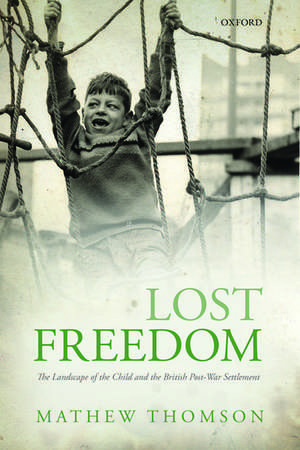Lost Freedom: The Landscape of the Child and the British Post-War Settlement
Autor Mathew Thomsonen Limba Engleză Hardback – 28 noi 2013
Preț: 803.68 lei
Preț vechi: 1155.69 lei
-30% Nou
Puncte Express: 1206
Preț estimativ în valută:
153.80€ • 159.98$ • 126.97£
153.80€ • 159.98$ • 126.97£
Carte tipărită la comandă
Livrare economică 03-09 aprilie
Preluare comenzi: 021 569.72.76
Specificații
ISBN-13: 9780199677481
ISBN-10: 0199677484
Pagini: 272
Ilustrații: 8 black and white halftones
Dimensiuni: 162 x 237 x 24 mm
Greutate: 0.56 kg
Editura: OUP OXFORD
Colecția OUP Oxford
Locul publicării:Oxford, United Kingdom
ISBN-10: 0199677484
Pagini: 272
Ilustrații: 8 black and white halftones
Dimensiuni: 162 x 237 x 24 mm
Greutate: 0.56 kg
Editura: OUP OXFORD
Colecția OUP Oxford
Locul publicării:Oxford, United Kingdom
Recenzii
In sum, this is a fascinating, well-researched and insightful contribution to the literature.
Recommended.
[A]t its heart the book is a close and convincing examination of the processes that turned the optimism of the post-war settlement into the pessimism that has reigned from the late twentieth century.
Thomson's book acts as a call to future research in these areas, as well as being a stimulating study in its own right. Its publication has obvious value for historians of childhood, but it also convincingly demonstrates how a study of attitudes and policies towards children can be critical to historians' understanding of modern Britain.
Mathew Thomson has provided a valuable service in offering an analysis that focuses on 'the landscape of the child' ... The book draws attention to some of the key ideas of social scientists about the landscape of the child; Thomson offers an interesting way of understanding more about the way in which the child was seen by sociologists and psychologists.
Lost Freedom sheds new light on decades that have lacked solid footing in modern British historiography ... Thomson's Lost Freedom will thus appeal not only to scholars working in the histories of children and childhood, but also to those more broadly interested in the history of the welfare state, the politics of psychology, changing meanings of emotion and family life, and the history of modern efforts to secure healthy human development.
Recommended.
[A]t its heart the book is a close and convincing examination of the processes that turned the optimism of the post-war settlement into the pessimism that has reigned from the late twentieth century.
Thomson's book acts as a call to future research in these areas, as well as being a stimulating study in its own right. Its publication has obvious value for historians of childhood, but it also convincingly demonstrates how a study of attitudes and policies towards children can be critical to historians' understanding of modern Britain.
Mathew Thomson has provided a valuable service in offering an analysis that focuses on 'the landscape of the child' ... The book draws attention to some of the key ideas of social scientists about the landscape of the child; Thomson offers an interesting way of understanding more about the way in which the child was seen by sociologists and psychologists.
Lost Freedom sheds new light on decades that have lacked solid footing in modern British historiography ... Thomson's Lost Freedom will thus appeal not only to scholars working in the histories of children and childhood, but also to those more broadly interested in the history of the welfare state, the politics of psychology, changing meanings of emotion and family life, and the history of modern efforts to secure healthy human development.
Notă biografică
Mathew Thomson is a Reader in History at the University of Warwick. He is the author of The Problem of Mental Deficiency (OUP, 1998) and Psychological Subjects (OUP, 2006).
